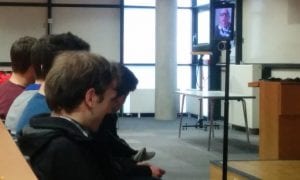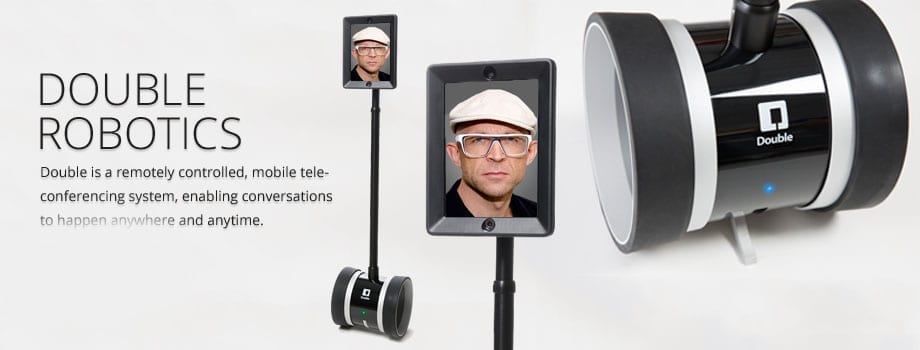Who said you can’t be in two places at once?

TV presenter, tech guru for
The Gadget Show and Visiting Lecturer Jason Bradbury showed us how by delivering a virtual lecture for our second year ‘Group Project’ students using new robotic communication technology.
Using a Double Robotics system, Jason was able to have a physical presence in front of our students, even though he couldn’t be there in person.
He presented his lecture, moved around the room and discussed creative new ideas with students, all from his base in London.“It is so exciting to be living in a time when technology enables you to teach an entire lecture theatre in person, despite being hundreds of miles away. Technological advances are improving our means of communication on a daily basis,” explained Jason. “I’m delighted to be able to deliver virtual lectures at the University of Lincoln as part of what is a very exciting project for the students.”
Jason’s lecture formed part of a module for second year Computer Science students, entitled My AI Ate My Homework. He tasked the students with a challenging new project – to design and develop an Artificial Intelligence (AI) system that is capable of passing the Turing Test.
The Turing Test was created by Alan Turing OBE, who was a pioneering computer scientist and mathematician and was instrumental in many technological developments during the 1940s. His work at the Bletchley Park codebreaking centre, where he lead a group to breaking the Enigma code, played a pivotal role in cracking intercepted coded messages that enabled the Allies to defeat the Nazis in World War II.
The Turing Test is a test of a machine’s ability to give the perception of ‘intelligent behaviour’, or to make itself indistinguishable from a human being. Thus, the student’s project would be to create a system which would make people believe they were interacting with a person, when really they’ve been responding to an AI robot.
Bruce Hargrave, Senior Lecturer in Computer Science at the University of Lincoln, is leading the module. He said: “Turing proposed that for a machine to pass his test, a human must be unable to tell if he or she was communicating with another human or with a machine. In computer science, the interactions between humans and robots are important areas of study and it is fascinating to explore what it is that distinguishes human behaviour from that of a machine. We are inviting our students to build their own machine with the ability to do just that – appear human.”Suggestions for the type of systems that could be developed by the students include an online agony aunt, a social media communicator, a fortune teller and a fast food ordering service.
The students will submit written proposals before developing their systems, with the aim of exhibiting them in public later in the year.
Related
 TV presenter, tech guru for The Gadget Show and Visiting Lecturer Jason Bradbury showed us how by delivering a virtual lecture for our second year ‘Group Project’ students using new robotic communication technology.
TV presenter, tech guru for The Gadget Show and Visiting Lecturer Jason Bradbury showed us how by delivering a virtual lecture for our second year ‘Group Project’ students using new robotic communication technology.